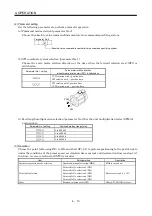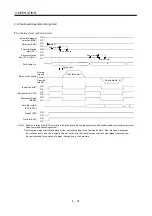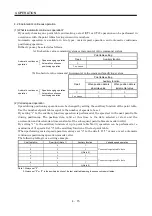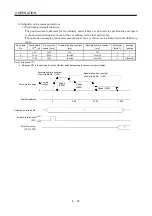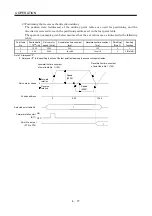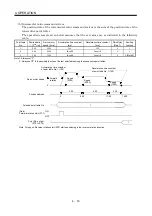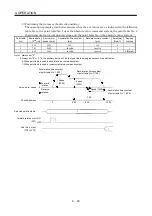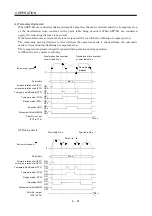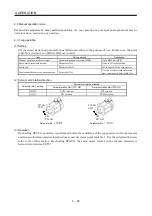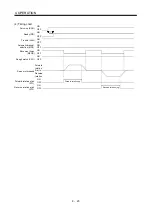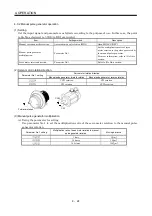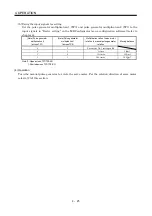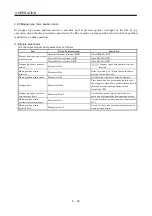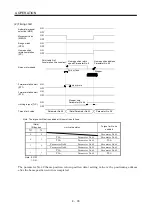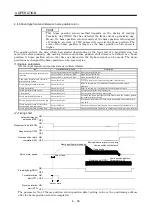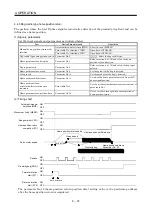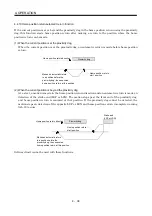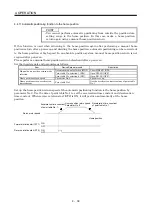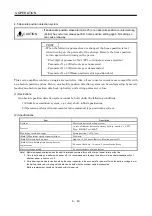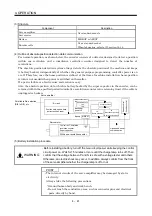
4 - 26
4. OPERATION
4.4 Manual home position return mode
4.4.1 Outline of home position return
Home position return is performed to match the command coordinates with the machine coordinates. In
the incremental system, home position return is required every time input power is switched on. In the
absolute position detection system, once home position return is done at the time of installation, the
current position is retained if power is switched off. Hence, home position return is not required when
power is switched on again.
This servo amplifier has the home position return methods given in this section. Choose the most
appropriate method for your machine structure and application.
This servo amplifier has the home position return automatic return function which executes home
position return by making an automatic return to a proper position if the machine has stopped beyond or
at the proximity dog. Manual motion by jog operation or the like is not required.
(1) Manual home position return types
Choose the optimum home position return according to the machine type, etc.
Type
Home position return method
Features
Dog type home position
return
With deceleration started at the front end of a
proximity dog, the position where the first
Z-phase signal is given past the rear end of the dog or
a motion has been made over the home position shift
distance starting from the Z-phase signal is defined as
a home position.
(Note)
General home position return method using a
proximity dog.
Repeatability of home position return is
excellent.
The machine is less burdened.
Used when the width of the proximity dog can
be set greater than the deceleration distance
of the servo motor.
Count type home position
return
With deceleration started at the front end of a
proximity dog, the position where the first Z-phase
signal is given after advancement over the preset
moving distance after the proximity dog or a motion
has been made over the home position shift distance
starting from the Z-phase signal is defined as a home
position.
Home position return method using a
proximity dog.
Used when it is desired to minimize the length
of the proximity dog.
Data setting type home
position return
The position reached after any automatic motion is
defined as a home position.
No proximity dog required.
Stopper type home
position return
The position where the machine stops when its part is
pressed against a machine stopper is defined as a
home position.
Since the machine part collides with the
machine be fully lowered.
The machine and stopper strength must be
increased.
Home position ignorance
(Servo-on position as
home position)
The position where servo is switched on is defined as
a home position.
Dog type rear end
reference
The position where the axis, which had started
decelerating at the front end of a proximity dog, has
moved the after-proximity dog moving distance and
home position shift distance after it passed the rear
end is defined as a home position.
The Z-phase signal is not needed.
Count type front end
reference
The position where the axis, which had started
decelerating at the front end of a proximity dog, has
moved the after-proximity dog moving distance and
home position shift distance is defined as a home
position.
The Z-phase signal is not needed.
Dog cradle type
The position where the first Z-phase signal is issued
after detection of the proximity dog front end is
defined as a home position.
Note. The Z-phase signal is a signal recognized in the servo amplifier once per servo motor revolution and cannot be used as an output
signal.
Summary of Contents for MR-J2S-10CP
Page 11: ...A 10 MEMO ...
Page 19: ...8 MEMO ...
Page 45: ...1 26 1 FUNCTIONS AND CONFIGURATION MEMO ...
Page 181: ...6 20 6 MR Configurator SERVO CONFIGURATION SOFTWARE MEMO ...
Page 207: ...7 26 7 DISPLAY AND OPERATION MEMO ...
Page 219: ...8 12 8 GENERAL GAIN ADJUSTMENT MEMO ...
Page 229: ...9 10 9 SPECIAL ADJUSTMENT FUNCTIONS MEMO ...
Page 231: ...10 2 10 INSPECTION MEMO ...
Page 249: ...12 8 12 OUTLINE DIMENSION DRAWINGS MEMO ...
Page 257: ...13 8 13 CHARACTERISTICS MEMO ...


